Political Context
North Korea is a highly secretive and closed state, ruled by the Kim dynasty since 1948. Kim Jong-il, the son of the first leader, took over after his father’s death in 1994. His son, Kim Jong-un, succeeded him in 2011, becoming one of the youngest rulers in the world. While the rest of the world is used to seeing their leaders make public appearances, news from North Korea is often sparse and contradictory. This was especially true in 2020, when Kim Jong-un appeared to disappear from the public eye without warning.
Given the country’s history of secrecy and frequent power changes, the question arises: is the leader of North Korea alive or dead? In recent months, media reports have speculated that Kim Jong-un is either ill, in hospital, or even dead. However, North Korean state media has continued to broadcast footage and photos of Kim Jong-un, who appears to be alive and well.
Expert Analysis
Many experts agree that Kim Jong-un is alive and in power. Andrei Lankov, a professor of Korean studies at Kookmin University in Seoul, argues that Kim is alive and “in power” but possibly weaker. He posits that, due to poor health or other issues, Kim’s visible presence has been curtailed, but he is still in command.
Michael Madden, a consultant for the US-Korea Institute at Johns Hopkins University, agrees. He believes that Kim Jong-un is at work, just in a weakened state. According to Madden, there have been no signs of a power struggle, which would be the case if Kim Jong-un was not in control.
Alternative Hypotheses
Despite the majority of experts believing that Kim Jong-un is alive and in power, there are still some who believe otherwise. Jung-kwon Kim, a professor at the Japan Institute of International Affairs, believes that Kim may have died of a heart attack. Jung-kwon bases this hypothesis on the recent absence of the North Korean leader from public events, suggesting something had happened to him.
The US government has also taken an officially neutral stance on the issue. When questioned about the leader’s condition in 2020, the US State Department simply replied that they were “unable to confirm” Kim Jong-un’s “well-being”.
Conflicting Evidence
The question of Kim Jong-un’s health has become the subject of intense speculation, with conflicting reports coming out of North Korea. While state media has reported that Kim attended public events, such as a court hearing and a parade, others argued that he looked frail and ill. This has spurred a debate within North Korea, with citizens guessing whether Kim is alive or not.
Moreover, inconsistent reports from North Korea have only fuelled the debate. For example, state media denied rumors of Kim Jong-un’s death, yet at the same time refused to confirm that he was alive and well.
Uncertainty
Despite all the reports and speculation, the fate of Kim Jong-un remains uncertain. He has been absent from public view for months, fuelling rumors and speculation about the current situation in North Korea.
The lack of information from the North Korean government has only served to increase the mystery surrounding the leader’s disappearance. To date, North Korean state media is broadcasting images of a seemingly weak leader, without confirmation of whether this is indeed Kim Jong-un.
International Impact
The uncertainty surrounding Kim Jong-un is affecting not just North Korea, but the international community as well. Kim’s disappearance has caused international concern, as the current situation in the region may be on the brink of a dramatic shift.
The situation has also caused tensions between the North and South Korean governments, after Kim’s absence sparked speculation of a hostile military move by South Korea. However, both governments have since put these speculation to bed, by stressing the need for dialogue and peace.
Regional Impact
The current situation in North Korea is also having a regional impact. Many of North Korea’s neighbours have expressed concern over the leader’s lack of communication and presence in recent months.
Japan has gone as far as to issue a travel advisory for its citizens travelling to the region. China has also urged caution, warning its citizens that “unfortunate incidents” could occur in the region due to the current instability.
Surveillance
In order to find out more information about Kim Jong-un’s health, the international community has implemented a series of measures. United Nations (UN) sanctions on North Korea have been in place since 2006, with the recent UN Security Council (UNSC) Resolution Inquiries aiming to strengthen existing measures by collecting evidence on the leader’s activities.
Furthermore, the US government has placed several North Korean vessels under surveillance, hoping to acquire more information on the leader’s health. This has received a mixed response, with some seeing it as a violation of North Korea’s sovereignty, while others applaud it as an exercise in international responsibility.
Conclusion
The international community is still uncertain about Kim Jong-un’s health and wellbeing, as the North Korean leader has been absent from public view for months. While some experts believe that Kim is alive and in power, there are still many who believe otherwise. Nevertheless, the lack of information from the North Korean government has done little to quell the speculation.
In order to gain more information on the leader’s health and activities, various international actors have implemented measures including UN sanctions, as well as US surveillance on North Korean vessels. Whether these measures will be successful in bringing to light more information on Kim Jong-un’s condition remains to be seen.


